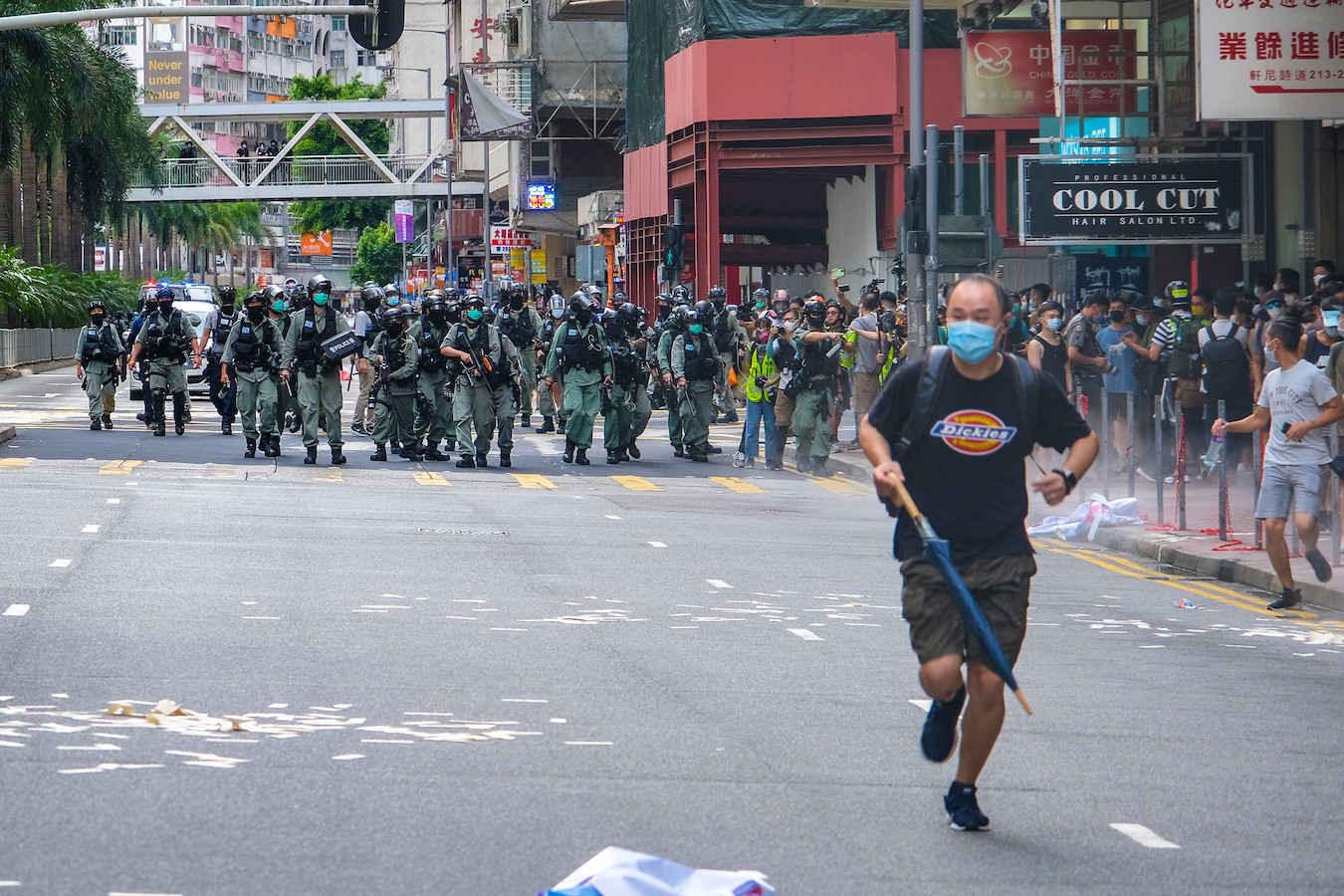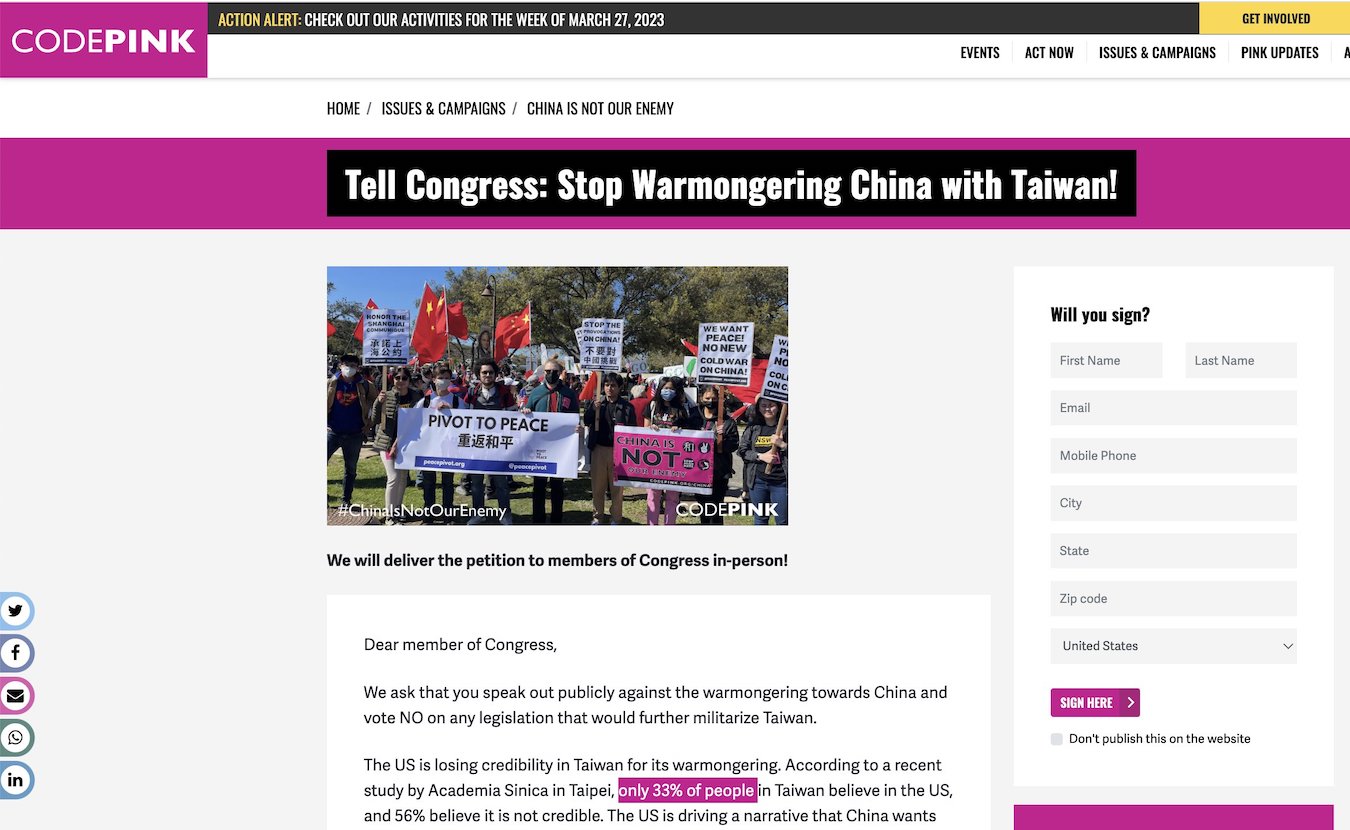by Brian Hioe
語言:
English
Photo Credit: Screenshot
A RECENT PETITION by Code Pink sees fit to ventriloquize the people of Taiwan, claiming that the people of Taiwan do not want war with China–certainly true–but then claiming that the people of Taiwan do not hope for support for the US against China. The petition goes on to cite polling by Academia Sinica.
It states: “The US is losing credibility in Taiwan for its warmongering. According to a recent study by Academia Sinica in Taipei, only 33% of people in Taiwan believe in the US, and 56% believe it is not credible.”
Many have seen the limited credibility has among the Taiwan public in Wave 2 (34%) of our survey. This was certainly a drop from Wave 1 (45.3%). However, credibility for 🇨🇳 is even lower for both waves, falling from 13.5% in Wave 1 to 9.4% in Wave 2. #Taiwan #PublicOpinion pic.twitter.com/08c0DfPtLU
— American Portrait (@AmerPortraitTW) April 11, 2023
This, of course, proves cherry-picking of statistical data by Code Pink for its own purposes. The same survey also found that only 9% of Taiwanese find China to be credible. As such, while the survey indicates growing distrust of the US in light of how the US could potentially use Taiwan as a geopolitical chess piece regarding China, China is still all the more distrusted.
The petition then goes on to pretend that China does not militarily threaten Taiwan, such as occurred in August 2022 after then-US Speaker of the House Nancy Pelosi’s visit to Taiwan or more recently after the meeting last month between current US Speaker of the House Kevin McCarthy and Taiwanese president Tsai Ing-wen.
“The US is driving a narrative that China wants to go to war on Taiwan, but China considers Taiwan to be its territory. The people know it is unreasonable to claim that China wants to attack itself.”
Of course, that is not the case. The people of Taiwan noted well the exercises directed by China at it, even if there was not exactly panic in the streets about the incident–China has had thousands of missiles pointed at Taiwan for decades.
The petition goes on to suggest that the voting behavior of Taiwanese shows that they do not approve of ties with the US.
“The people of Taiwan are speaking with their votes and in the streets that they want peace, but the US continues to escalate tension.”
Of course, it is the historically independence-leaning DPP that currently holds power in Taiwan. And while tankie leftist groups like to cite the results of the 2022 local elections to suggest that it is the KMT that enjoys support in Taiwan and will win the next elections, local elections are primarily about local issues and not cross-strait ones.
It is not as though the result of one election invalidates all other elections, particularly when the KMT often does better in local elections such as in 2018. But this is no obstacle for the DPP winning again in 2020 during the presidential elections. It is doubtful that American groups such as Code Pink would consider the Democratic Party no longer exists as a political force following the election victory of Donald Trump in 2016, so why would they see Taiwan through such a lens? Nor would this even necessarily mean anything about what Taiwanese desire about their long-term future if the KMT wins, seeing as its presidential candidate Hou You-yi is moderate on cross-strait issues.

Photo credit: Studio Incendo/Flickr/CC BY 2.0
The petition then drops any pretense of anything but a rose-tinted lens on China:
“China is leading in building peace in the world. In March, China brokered peace between Saudi Arabia and Iran and brought a possible lasting peace to Yemen. In April, China offered to facilitate peace in Palestine. A week later, China’s Xi spoke to Ukraine’s Zelensky and pledged to send special representatives to facilitate peace talks to end the death and destruction in Ukraine. As China makes peace around the world, the US cannot claim that China wants to attack Taiwan, its own territory resided by people of their shared ancestry.”
Again, Taiwan has had decades of Chinese threats, so quite obviously know this is not true. As the brutal repression of protests in Hong Kong and domestically in China itself show, the Chinese government has no hesitancy in the brutal repression of people that it claims to be its nationals.
And in what world does China facilitate peace altruistically, except framing itself as such as part of efforts to expand its own power? This is no different than the US, except Code Pink members seem unable to perceive convergent behavior between the US and China. Instead, China is idealized in highly abstract terms, even when they prove more critical of the US. Such is the insularity of the western left.



